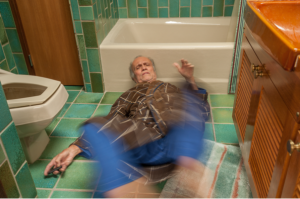Home Health Care: Senior Fall Prevention Strategies
Seniors can easily fall while in their own homes. Here are some senior fall prevention tips ideas and tips for making seniors safer at home.
MONROE TOWNSHIP, NEW JERSEY, UNITED STATES, January 11, 2020 /EINPresswire.com/ -- Every year, 3 million seniors are treated in the emergency room for fall injuries, as reported by the CDC. And, falling once doubles someone's chances of falling again. Maybe it's time to get a profession Seniors can easily fall while in their own homes. This piece discusses strategies for senior fall prevention with ideas, tips for making seniors safer at home
Preventing falls and accidents in the home is crucial when planning home health care strategies to help keep senior family members stay independent. Fractures, head injuries, hip fractures, broken bones, and other serious injuries can cause long term mobility issues and have lasting physical effects. And, after an injury occurs, it can affect a senior's ability to live the way they want and enjoy the same lifestyle and activities that they once did.
Unfortunately, some health issues occur more often as we age, which can also make older persons more likely to fall.
These risk factors can include the following:
Alzheimer's disease and other dementia
Low blood pressure
Poor vision
Muscle weakness
Heart disease
Parkinson's disease
Malnutrition
Pain or sensitivity in the feet or legs
Ear infections or inflammation
There are some precautions that both senior adults and their families can take to reduce the likelihood of a fall and a professionally trained home health care aid understands these risks.
Evaluating the individual's risk factors and taking preventative measures in a way that acknowledges the unique lifestyle, needs, and health of a senior can help.
Evaluate choice of footwear– Shoes that have an open back, don't fit properly, are worn out, or have a slippery bottom can all contribute to balance problems or tripping. There is a wide selection of safe shoe options to fit any activity and personal style - who says safe shoes have to be boring?
Understand the effects of medication– Seniors and their families should make it a point to discuss with a healthcare professional how a person's specific medications – both over-the-counter and prescription – can have side effects that cause balance issues or dizziness.
Minimize trip hazards– Sure, some fall hazards are rather obvious; slippery shower floors, flights of stairs, or cords that are too far from a wall outlet. But, there are also less obvious features that can be an issue for someone with dizziness or vision loss. These can include certain types of carpeting, loose throw rugs, dimly lit hallways, or a pet toy in the middle of the floor. Removing the hazard or installing safety devices, like grab bars, handrails, non-slip mats, and brighter light bulbs, can help.
Nutrition and exercise– Engaging in healthy habits when it comes to exercise programs and diet plans can prevent weakness in the legs and feet and can reduce pain. The NCOA and CDC promote community-based programs, including A Matter of Balance, Stepping On, and Tai Chi, which all promote fall prevention physical activity. Seniors should always talk to their primary physician, occupational therapist, and or physical therapist about any diet and exercise program. They can ask specific questions about how these things affect their fall risk factors.
Make mental health a priority – Studies have shown that there is a distinct correlation between depression in seniors and falls. One report explains that "both depression and fear of falling are associated with impairment of gait and balance." Positive mental health can improve many areas of a senior's life, and reduced fall risk is one of the incredible benefits. Connecting with loved ones, engaging in enjoyable activities, finding a sense of purpose, and experiencing joy can improve physical and mental quality of life.
In some cases, families only consider fall prevention tactics after a loved one is hurt. Taking precautions before an accident occurs can help older adults maintain their physical health and their independence and reduce the risk of falling.
Comfort Keepers® Monroe Can Help
The professional Caregiver team at Monroe Comfort Keepers provides a thorough home evaluation to minimize hazards in the home – including a fall risk evaluation. Our in-home caregivers help with mobility issues, provide light cleaning services, provide transportation to and from physician visits, shopping, running errands, and more.
The Comfort Keepers of Monroe even support exercise and diet plans that are physician prescribed. The Caregiver professionals' ultimate goal is to keep seniors and those aging in their homes, safe, happy, and well cared for while providing comfort to their family members.
We ensure that their loved ones are being carefully monitored and are receiving compassionate senior care services from our home healthcare aid.
To learn more about our short-term and long-term care services, contact Comfort Keepers of Monroe today at (732) 521-1777
Additional Resources
Centers for Disease Control and Prevention (CDC) - Statistics and information about older adult falls
National Council on Aging - Information on fall prevention programs
This release was drafted by Results Driven Marketing®, LLC: a full-service digital marketing, public relations, advertising, and content marketing firm located in Wynnewood, PA.
Stephanie Howe
Comfort Keepers of Monroe Township
+1 732-521-1777
email us here
Visit us on social media:
Facebook
Twitter
LinkedIn
Legal Disclaimer:
EIN Presswire provides this news content "as is" without warranty of any kind. We do not accept any responsibility or liability for the accuracy, content, images, videos, licenses, completeness, legality, or reliability of the information contained in this article. If you have any complaints or copyright issues related to this article, kindly contact the author above.


